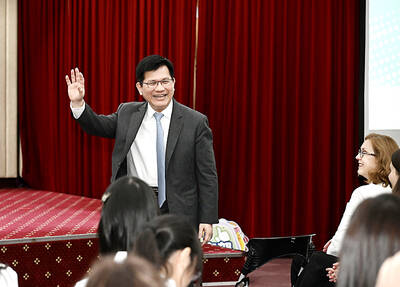An exiled Uighur activist accused China yesterday of trying to use its economic clout to dampen criticism of its human rights record, while Australia's foreign minister said Chinese diplomats who opposed her trip should mind their manners.
Rebiya Kadeer addressed the National Press Club in the capital, Canberra, despite objections by a Chinese diplomat, who the club said made it clear that Beijing did not want her to speak.
She thanked the club for ignoring China's bullying and thanked Australia for resisting “enormous pressure” from Beijing to deny her a visa to visit the country and make a series of public appearances.
China has repeatedly and strongly objected to Kadeer's trip, raising tensions between Canberra and Beijing even as ties are stretched by the case of an Australian mining industry executive being detained in China on suspicion of spying.
Beijing accuses US-based Kadeer of inciting recent riots between Uighurs and members of the dominant Han Chinese group in Xinjiang that killed at least 197 people and injured more than 1,700. She denies it.
In her speech, translated by an aide acting as an interpreter, Kadeer said China had been using its economic clout to try to intimidate nations into softening criticism of its human rights record.
“It is a fact that the Chinese government has been exerting enormous pressure on Western democracies because of its huge trade, in order to dampen down the Uighur and Tibetan issues in all these different countries,” Kadeer said.
China is Australia's largest export market, buying billions of dollars in coal, iron ore and other raw materials each year, and maintaining strong economic ties is in both countries' interests.
Kadeer criticized the Chinese government for its use of its “economic and trading power to threaten other countries and impose its authoritarian will.”
“The international community, Western democracies, should not be intimidated by such threats because China needs them more than the Western democracies need China,” she said, citing China's appetite for Australian raw materials as an example.
Australian Foreign Minister Stephen Smith said earlier that foreign diplomats were entitled to voice the position of their governments on any issue but that they must do so politely.
Beijing's Canberra embassy Political Counsellor, Liu Jing, met management at Canberra's National Press Club last week and requested they withdraw an invitation for Kadeer to speak, the club said.
“Embassies, diplomats, officials are entitled to put views in Australian society, but when they put those views, those views have to be put appropriately,” Smith told state radio.
Liu told the press club it would be “regrettable” if diplomatic relations between Australian and China were harmed by Kadeer speaking there, club chief executive Maurice Reilly said.
“The press club and the board have a long-standing policy of 40 years or more that they decide who speaks at the press club, and they are quite free of outside influence,” said Reilly, confirming Liu's approach.
“We listened respectfully and we pointed out that China has a different social system to our social system,” Reilly said.

FIREPOWER: On top of the torpedoes, the military would procure Kestrel II anti-tank weapons systems to replace aging license-produced M72 LAW launchers Taiwan is to receive US-made Mark 48 torpedoes and training simulators over the next three years, following delays that hampered the navy’s operational readiness, the Ministry of National Defense’s latest budget proposal showed. The navy next year would acquire four training simulator systems for the torpedoes and take receipt of 14 torpedoes in 2027 and 10 torpedoes in 2028, the ministry said in its budget for the next fiscal year. The torpedoes would almost certainly be utilized in the navy’s two upgraded Chien Lung-class submarines and the indigenously developed Hai Kun, should the attack sub successfully reach operational status. US President Donald Trump

Taiwan Semiconductor Manufacturing Co (TSMC, 台積電) is expected to start construction of its 1.4-nanometer chip manufacturing facilities at the Central Taiwan Science Park (CTSP, 中部科學園區) as early as October, the Chinese-language Liberty Times (the Taipei Times’ sister newspaper) reported yesterday, citing the park administration. TSMC acquired land for the second phase of the park’s expansion in Taichung in June. Large cement, construction and facility engineering companies in central Taiwan have reportedly been receiving bids for TSMC-related projects, the report said. Supply-chain firms estimated that the business opportunities for engineering, equipment and materials supply, and back-end packaging and testing could reach as high as

ALL QUIET: The Philippine foreign secretary told senators she would not respond to questions about whether Lin Chia-lung was in the country The Ministry of Foreign Affairs on Wednesday confirmed that a business delegation is visiting the Philippines, but declined to say whether Minister of Foreign Affairs Lin Chia-lung (林佳龍) is part of the group, as Philippine lawmakers raised questions over Lin’s reported visit. The group is being led by Deputy Minister of Agriculture Huang Chao-chin (黃昭欽), Chinese International Economic Cooperation Association (CIECA) chairman Joseph Lyu (呂桔誠) and US-Taiwan Business Council (USTBC) vice president Lotta Danielsson, the ministry said in a statement. However, sources speaking on condition of anonymity said that Lin is leading the delegation of 70 people. Filinvest New Clark City Innovation Park

TPP RALLY: The clashes occurred near the Chiang Kai-shek Memorial Hall on Saturday at a rally to mark the anniversary of a raid on former TPP chairman Ko Wen-je People who clashed with police at a Taiwan People’s Party (TPP) rally in Taipei on Saturday would be referred to prosecutors for investigation, said the Ministry of the Interior, which oversees the National Police Agency. Taipei police had collected evidence of obstruction of public officials and coercion by “disorderly” demonstrators, as well as contraventions of the Assembly and Parade Act (集會遊行法), the ministry said in a statement on Sunday. It added that amid the “severe pushing and jostling” by some demonstrators, eight police officers were injured, including one who was sent to hospital after losing consciousness, allegedly due to heat stroke. The Taipei